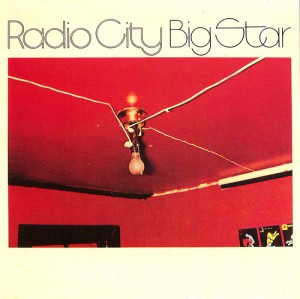
“You get what you deserve.
You ought to find out what it’s worth.
And you’ve gotta have a lot of nerve.”
The follow-up to Big Star’s delectable debut arrived after Chris Bell had left the band, returned, then left again, leaving the remaining three members, led by songwriter Alex Chilton, to forge ahead as a trio. The absence of Bell’s instinctive touch is evident throughout the creaky and uneven Radio City. The sophomore album is rougher around the edges, less polished, and in the end simply not as good as its predecessor. Chilton still plows ahead trying to capture the same sound, but without Bell most of the songs fall short.
Though uncredited, before his departure Bell had helped to write two songs that appear on Radio City—opener ‘O My Soul’ and ‘Back of a Car’—which happen to be two of the better numbers on the album. The former, a funky rocker, features enough musical ideas to flesh out multiple songs; and Jody Stephens does his best Keith Moon impression filling in every spare moment on the track (as he does elsewhere on the album). If they would have made more songs like this, the album could have been another classic. Instead, the songs on Radio City are stylistically similar but lesser in quality than those on #1 Record.
Where more laid back songs like the wholesome ‘The Ballad of El Goodo’ and the acoustic-led ‘Thirteen’ anchored the first album, the sophomore effort is driven by a syrupy riff-driven pop-rock sound that predicts the benign power pop of acts of the ‘80s and ‘90s. Despite the band’s relatively sparse discography and lack of commercial success, they are cited as an influence by many younger bands. Like The Velvet Underground, their albums didn’t sell well but strongly influenced those who happened to hear them. Of those bands that cite their albums as formative, I think most of that influence comes from Radio City; which, considering it’s my least favorite Big Star release (ignoring the existence of In Space), probably explains why I don’t really love any of those bands—acts like R.E.M. or The Replacements (who even named a song after Chilton).
Chilton was no doubt a talented individual, and he had a wide-eyed ambition and songwriting prowess; but Bell seemed to be a catalyst for him that allowed Big Star’s songs to jell into fully realized miniature masterpieces. Chilton by himself (or nearly; Stephens and bassist Andy Hummel are given a few co-writing credits) simply doesn’t seem to have the capability to consistently form his ideas into compelling and cohesive songs. Many of the tracks here are built around very basic riffs, and the lyrics—like those of #1 Record—are mostly simple lovey dovey drivel. Suitable for unremarkable pop songs, which is what a lot of these are.
The slower songs fare about the same; ‘What’s Going Ahn’ is probably the best of the ballads, but it doesn’t hold a candle to ‘Thirteen’. The retrospective drooling over ‘September Gurls’1 seems out of place. Sure, the guitar tone is pretty slick, and it’s one of the better songs here, but it’s just pretty good in my book.
As with #1 Record, the production value here is lush; and the guitar tones are especially succulent and modern. But the messy songwriting doesn’t make for quite the pleasant listen that #1 Record does, and falling back on the emotionally homogeneous and trite lyrics leaves me feeling a bit underwhelmed, so I’ll always prefer the former.
Favorite Tracks: O My Soul; Back of a Car; Daisy Glaze; September Gurls.
1. Rolling Stone ranked it as the 180th best song of all time.
Sources:
“500 Greatest Songs of All Time”. Rolling Stone Magazine. 7 April 2011.